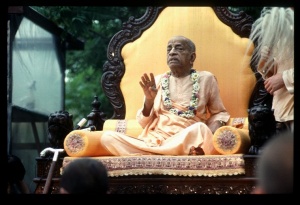CC Madhya 13.148

A.C. Bhaktivedanta Swami Prabhupada
TEXT 148
śuniyā rādhikā-vāṇī, vraja-prema mane āni,
bhāve vyākulita deha-mana
vraja-lokera prema śuni’, āpanāke ‘ṛṇī’ māni’,
kare kṛṣṇa tāṅre āśvāsana
SYNONYMS
śuniyā—after hearing; rādhikā-vāṇī—the statement of Śrīmatī Rādhārāṇī; vraja-prema—the love of Vraja; mane āni—remembering; bhāve—in that ecstasy; vyākulita—very much perturbed; deha-mana—the body and mind; vraja-lokera—of the inhabitants of Vṛndāvana; prema śuni’—after hearing of the loving affairs; āpanāke—Himself; ṛṇī māni’—considering very much indebted; kare—does; kṛṣṇa—Lord Kṛṣṇa; tāṅre—unto Her; āśvāsana—pacification.
TRANSLATION
After hearing Śrīmatī Rādhārāṇī’s statements, Lord Kṛṣṇa’s love for the inhabitants of Vṛndāvana was evoked, and His body and mind became very much perturbed. After hearing of their love for Him, He immediately thought Himself to be always indebted to the residents of Vṛndāvana. Then Kṛṣṇa began to pacify Śrīmatī Rādhārāṇī as follows.